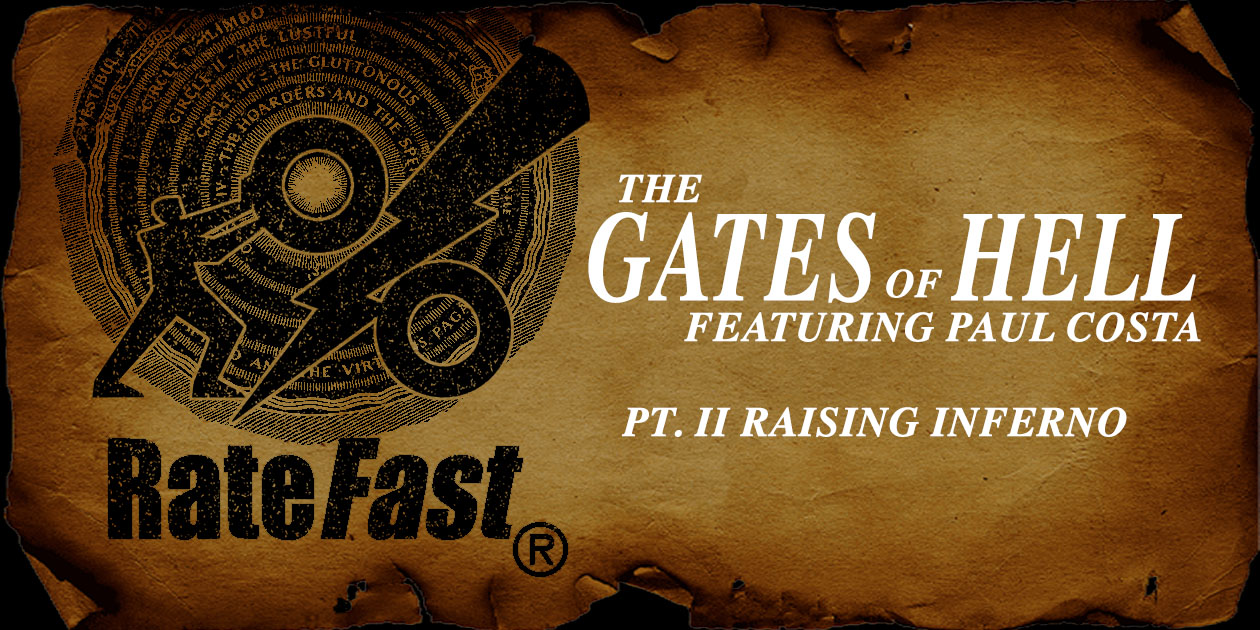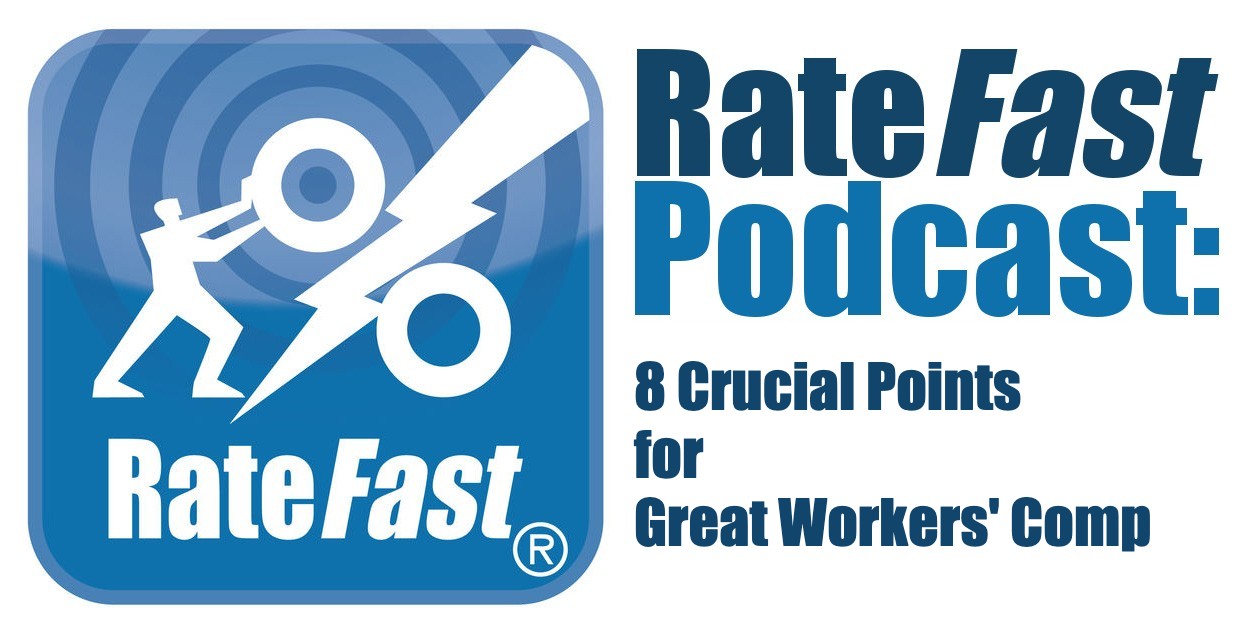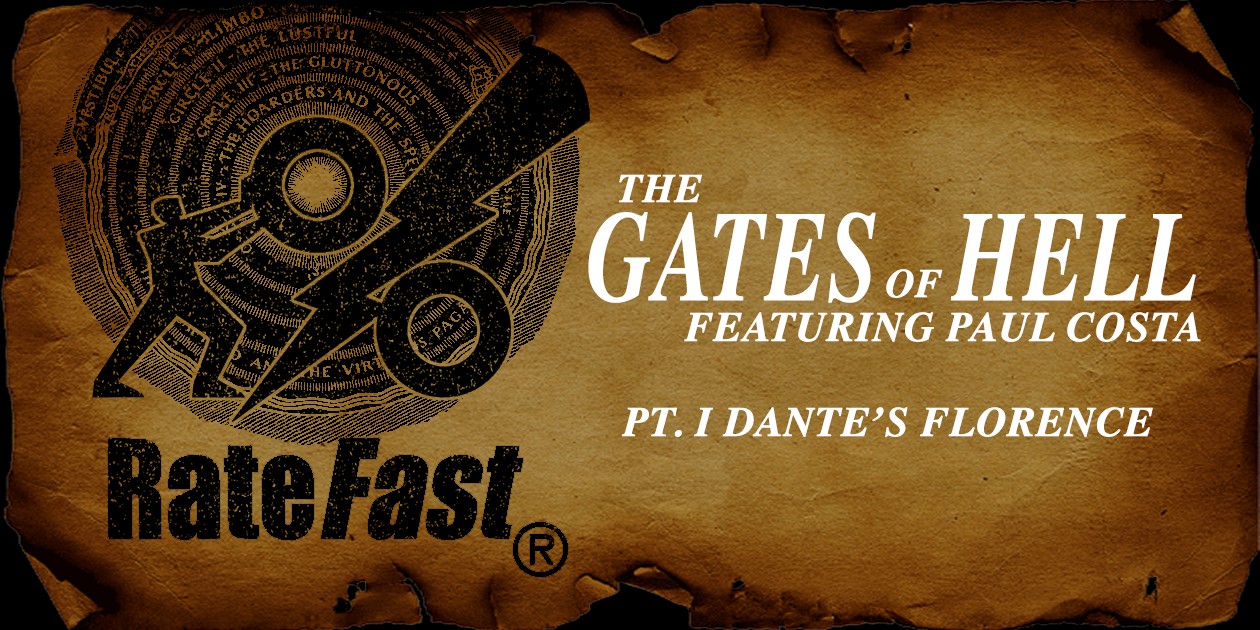This is a special series, and a bit of a change from our usual workers’ compensation programming.
Historian of Italian art and owner of Tuscan Tour Guide, Paul Costa, takes us on a trip to the dark ages, to get a glimpse of what life was like in late 13th century Florence and surrounding cities.
Paul illustrates the factors that imposed upon the daily life of the common people during this time. We examine the conditions that set the stage in the mind of one Dante Alighieri, who would go on to create one of the most significant literary works in history: Inferno.
But why Dante? What does this have to do with workers’ compensation? We will arrive at the answer at the end of our series. To get there, we must go through Inferno itself. See you in hell.
If you’re a workers’ compensation provider, adjuster, or case manager check out RateFast Express: the service that writes your impairment reports for you!
RateFast Podcast: The Gates of Hell Pt. I – Dante’s Florence
Cory Oleson (Host): And we are back in the studio today. And usually we have Dr. John Alchemy as a guest on the California Work Comp report podcast. But today we actually have no John and we have a very special guest to introduce, Italian art historian, Paul Costa. How are you doing today, Paul?
Paul Costa: Hi, Cory. How are you doing?
Cory: Well, we are doing something very different with a California Work Comp report podcast. And we are taking a trip through Italy. And visiting through time and space and visiting not only Italy of the 13th century, we are visiting Italy of the 13th century, and eventually we will be visiting Hell, itself. Today, Paul is going to speak to us about some backstory on Dante Alighieri. And what the kind of climate of, of 1300s or 1200s Italy was like, and before we get into the weeds, Paul, tell us a little bit about yourself and how you know so much about all of everything we’re about to hear.
Paul: Well, of course, to be blunt, very honest with you, I just make it all up as I go.
Cory: Wonderful. That’s what we do, too.
Paul: It’s never the same.
Cory: No doctor is actually learning anything listening to this, because it’s all lies. No, I’m kidding.
Paul: All joking aside, it really fell into all it fell into my plate. I nothing. None of this was planned, as I’m sure many of you are doing things in your life that you didn’t plan as a child. I was born in New York, Italian immigrant parents. They they felt a little uneasy in the 1980s in New York. So at that point, I was alive with my brother, and we moved as a family to Tuscany. And this is where the magic happened because nobody knew what was actually happening to all of us. But things went sour for my parents in the 80s. And we went back to New York City, where I finished my college degree there and so on and so forth.
But the college degree was in Italian Renaissance art history. So it had everything to do with what I had lived and seen through my childhood while I was in Tuscany, and Florence and Pisa and so on, Janine Yano and Sienna.
Cory: So all the places that I as a very small as a person with a vested but small interest in art history myself, it’s somebody somewhere where I’d love to just go around and see everything huge fan of Bernini’s work.
Paul: And it’s kind of it all does truly fit in it. It’s a place where I think most people in the world have on their bucket list. Tuscany is one of the places to go to it is you know, you have Rome and Venice, but not everybody knows about the details of Florence. And when you do get there and you do take a tour of it, you start understanding that Rome became Rome because of Florence and because of the influence that emanated from that from that very potent city, extremely rich. It was it was Poland for a reason. There were streets that that went through Tuscany, which made farmers quite wealthy, made merchants quite wealthy. But we’ll get into that shortly. What I just wanted to conclude about myself is that I gave up the states again, and moved back to Italy by myself as an adult, I guess. But at that point, I had my master’s degree in Italian Renaissance art history, and we’re about 20 years ago, I opened up my own company in Florence called Tuscany tour guide. And I organize tours throughout all of Italy. And I try to tie in all those dots that we all know about, we all learned about in middle school in high school and some college classes.
But I tie in the world not being flat, and the world being round and Galileo and Columbus and the Pope’s and the metal, cheese and Venice. And I tie in the biggest church in the world with St. Peter’s Basilica, because it wasn’t always St. Peter’s Basilica in Rome, and the Vatican. So I tried to tie in all these dots, and most of my customers come away quite content, not necessarily of what they learned about Florence. But I’ve connected all these dots that they’ve always had in their heads, it just never, they never knew how to put them in a straight line. So that was that that’s what really got me going. I really love doing that.
Cory: Absolutely. There’s so many names that we recognize, and then, you know, these historical figures that we recognize, and then when you especially, you know, I want to say especially when you take a tour through an area, people, like you say, well connect those dots and make people realize that that a lot of these people knew each other and existed in the same space and time as each other. And we’re in many ways influencing each other. And, and were part of, you know, what I would like to consider a scene of sorts, or you know, it community or, you know, something in artistic milieu of the time.
Paul: Especially when you enter the Renaissance, absolutely, yeah, the middle ages can be a little too long, they’re a Middle Ages are 800 years long, so that not too many people overlapped. As much as we actually talk about all the people in the Renaissance, which were only 200 years. So Leonardo and Michelangelo did hang out, you know, in a hole, and Michelangelo, a whole bunch of Popes did hang out, and they knew each other. So it was just a short 200 years. And in those 200 years, you have all the names that we know, you have Columbus and Galileo and they were all there in the same part of Italy pretty much so they do intertwine very easily. Well, when you talk about the Middle Ages, it’s a little bit more difficult, just because they’re 800 years long.
Cory: Absolutely. And even though the dots are a little more kind of spaced apart there, you know, there are, you know, the dots that do a shine out of that era shine bright. And, you know, I was thinking right before the podcast how you know, it, there aren’t too crazy many contemporaries that have Dante that one can just point out and say, you know, the way that the way that you could kind of point out that contemporaries of the, you know, the Renaissance age, are there such thing?
Paul: No, not at all. Yeah, absolutely. Right about that. And that’s, that’s, that was something that was one of the reasons why I wanted to start off where I am going to start off, which is 1192. Because 1192 doesn’t mean anything to anybody, pretty much.
Cory: Yeah. Christ as well may have been alive, or may as well. You know, anything from you know,
AD or zero or what have you to basically the 1500s, the invention of the Gutenberg Press, you know, it’s all it’s all sort of a blur, a single thing.
Paul: In many dots, as you said, so and yeah, it depends on who you talk to as well. If I say 1192 to an American, the 1492 will pop into their head because 92 is that magical number.
Cory: Exactly. Exactly. Exactly. And it’s what and it’s what popped into my head.
Paul: So let’s start off with 1192. Chaps, let’s take a trip back. We’re going 300 years free, Columbus, the world is not flat, not to Columbus, not to the Spaniards, not to the Pope, not to anybody. What we do have some issues in regards to what rotates around what so we the center of the universe, and the sun rotates around us or vice versa.
Cory: The Centric model or the or the heliocentric model is the Earth revolves around the Sun and the planet, right, but the ascension, which is you know, about around God, and that’s it.
Paul: So if we go back to 1192, the thing that interests me and us tonight is really what started off Florence. And what made it come out of the middle ages because the Middle Ages go from roughly the year 500. So when the Roman Empire fell 476 to be exact, so when the Romans fall in his normal Roman Empire, it all goes down down the to the Middle Ages begin and there is a huge decline in many aspects are no more bathhouses, no more awkward ducks no more coliseums being used while it’s because there’s a lack of taxes really coming in. So the Emperor, so all the city states and feudal city states all start in the year 500. It goes to 600, 700, 809, 900, 1011, 1092 where they don’t know it, obviously, but 650 700 years into it, we’re starting they’re starting to get out of the Middle Ages.
So money’s rolling around, people have a few extra bucks in their pocket. Now, I’m not saying people are doing well, but people do have extra time on their hands. Because as you’re making money that is allowing you not to work so much. And with that extra time, in your daily routine, you can have some fun, you can go out to dinner, you can go to the movies.
Cory: You can take a you know, burn the end of a stick and draw something with it. Right?
Paul: They were doing that. So, yes and no, the church was doing quite well, in the Middle Ages. And they obviously wanted to promote the church in Jesus and Catholicism to be specific. And to say that, we need to keep in mind two things, as I’m talking throughout tonight, that there are no schools, there’s no such thing as a school. Throughout this entire podcast. Nobody went to school, if you were learning something, you were a monk or a fry or a priest in mystery, or you were getting home schooled, which means you have a lot of money.
Yes, yes. So there’s no printing press. You mentioned Gutenberg before. So 1190 to 1200. Let’s say it’s just rounded up to 1200. There’s no schools in Florida, there’s no schools in Italy. There’s no schools in Europe, because I’m just going to blow it up from Florence to Italy to Europe, because everything is going to revolve around Florence tonight. No schools, no printing press, if you want to book we can’t even call it a book, we got to call it a manuscript. Right? So yeah, and the word manuscripts comes from mono, right? So hands, because somebody is physically copying it one page at a time.
Cory: One word, if you get a copy of the Bible, it was written from a by a by a priest or a friar or something like that, who meticulously copied from another copy of the Bible. I’m sure there was a, I’m sure there was a point where some of these guys could just write the book from memory.
Paul: Not only that, I mean, it was it was pop culture. I mean, I don’t want to make the Bible not as important or religious as it should be. But the Bible was the only book circulating. That was manuscripted quite a few times. And as we know, later on in the 1500s, when Gutenberg does have the printing press, the first book that was printed was the Bible. So if it’s the only books or only book circulating only manuscript circulating, people knew quite a bit about it, and the Middle Ages not being a great time to be around, people will looking for hope. And here’s my maybe my first question for you Cory. But if you’re looking for hope, who do you turn to?
Cory: Well, all good times, well, oftentimes, it will be an authority figure who will sort of be reassuring thing, and that authority figure could, could come in the form of a god or if you will, you know, something, something that multiple, that your community can agree upon, is something out, outside and more powerful, whose ways are deliberate, and that you can attribute that deliberation to, in order to explain this kind of tedious, correct lifestyles?
Paul: Yeah, exactly. So you hit it right on the head. So you’re going to the gods, the Greeks wanted the gods, the Macedonian, gods, the Egyptian gods, the Romans after the gods, and we go to Gods before the most of us go to some sort of God.
Cory: Our Gods might, you know, have take a little more of a terrestrial flavor nowadays.
Paul: Sure, absolutely. I mean, things do evolve, right? And then you get God on Earth, which changed things, because not too many gods send their son to Earth, in a human flesh form as the Christians believe with Jesus Christ.
Cory: Absolutely. How do you how do you interpret that?
Paul: So there goes the Bible, you got it. When you don’t have the answers, you turn to the Bible, and the Bible will help you and God will help you. So no schools ended the Middle Ages, no printing press, the book that everybody knows about is the Bible, not because they were reading it, or because they were having a monk, have them copy it. It’s just because everybody was looking for hope in the Middle Ages, and most not all, most were going to church, if not on a daily basis, definitely on a weekly basis. So the homilies were very different than what they are today. Most churches today, most Christian churches focus on the New Testament during the homily, where in the in the Middle Ages, they focused on the Old Testament as well. So people knew about Old Testament figures and New Testament figures. Because you can’t you don’t get the new unless you read the old.
Yeah, so people were illiterate. But what that illiteracy, and that’s this is where I just love children, I have to have my own and they still blow me away because they’re six and eight years old, and they’re learning how to read. And when I open the book, and I still read to them before we go to bed at night, sometimes I’m reading and I’m assuming my eight year old is following the words with me, but she’s not she’s actually looking at the pictures. It’s, it’s quite amazing how they’re still focusing on pictures, because that’s what she has been doing for the first eight years of her life.
Cory: Sure, sure. It’s a symbolic representation of reality, looking at looking at a picture. So you’ve got this. It’s more recognizable, if you will.
Paul: Absolutely. So if there goes the saying a picture says 1000 words, right? And if you do have an illiterate Europe, which is what we’re talking about tonight, so there’s no schools, no printing presses, let’s say 98% of Europe is illiterate. Well, how do you teach that people are not stupid people have never been stupid. It’s just the matter of how to teach these people something that they should know. And I want them to know, and I’m the priest talking right now. So I taught during the homily I taught, I speak about Moses, and can enable and Abraham and all the Old Testament guys, and then and stories.
And then we move into the New Testament, and we go to all the saints. So we go from prophets to saints, but they’re going to forget these stories. And I know that as a priest, as a friar, as a monk, they’re all going to forget, because we have, we drink our wine, we eat our meals, we have our wives and children, and we have to go far. And we have to go make jewelry, we have to go make houses make furniture, everybody has their own job who sews, so everybody has jobs. And we forget about all the stories because there are quite a few stories in the Bible. And there go along the images that you mentioned that you got a piece of charcoal maybe and scribble something, well, they were very advanced in the Middle Ages, right, because the church did not want you to forget these scenes and stories. So we had wonderful, we have wonderful paintings and frescoes in the churches that still around all of Europe, all done during the Middle Ages.
Cory: And when I when I talked about the charcoal on a stick thing, the there have been, Greece had already happened by the, you know, like the, it was a more of a more of a, say, illustrating that there was a little more time for leisure for the person to to do. But to your point about the fact that you know just just injecting this in here, to your point about people listening to the a sermon, and the priest wants him to remember it. But you know, they’ve got to do this. You know, they’ve got to do their other things and they kind of forget and everything like that, you know, it’s weird. You know, I were doing a podcast, I listened to podcasts, I listened to podcasts about things that I’ve invested in and things like that, and they come out on a weekly basis. And I don’t remember the last week’s one by the next week. So by the time the next week’s episode comes out, so we’re not you know, it just another illustration of how we’re not that different.
Paul: We are overloaded and routed out. We’re bombarded today’s world is bombarded with with with everything with news that has never silence, right even a supermarket. There’s always music around and there’s always noise, white noise, but there’s always noise.
Cory: In fact, we’ll have to people people will have to do things to escape this silence when it’s actually there now yeah, of course.
Paul: Yeah. So back then you take away rubber soled shoes, no sneakers you take away on glasses, you take away plastic from the world. You take away TVs and radios and podcasts and everything. Yeah. How do you tell time on a rainy day? Exactly. When we get to Florence and I hope I hope some of the listeners do come to Florence and do contact me because it’s kind of neat to to physically be in Florence and one of my questions is we’ll have to do a tour with me they’ll know the answer. But if you do if you take a tour with me my when we get to the Duomo, which used to be the biggest church built on planet Earth and Florida next to get the bell tower. And my question is what was the use of the bell tower? Why were there bells on this tower?
And many people get it some people don’t get it. But then I follow it up with how do people know what time it was back then? Exactly. Take the wheel clocks in the world. You take all the digital clocks in the world that analog clocks in the world take everything away. But how the heck do you tell time? So sundial, great, so you have sundial in your in your pocket? You take it out as a sundial on a wall somewhere and you look for it. But let’s make it 11pm on a rainy Sunday night. What time is it? And there we go there goes the bonus you know the people listen the bells back then, and the church was in charge of ringing the bells appropriately every 15 minutes to tell the world where the town for that matter what time it was. So there were, we think that life is easy today. And it is we have a lot of cool things that make our lives a lot easier. But back then, they had some cool ingenious things as well. It doesn’t necessarily mean that just because modern life is nice that it was just squatted back then.
Cory: Absolutely not. Absolutely not. Right. Absolutely.
Paul: And the more and more of the most important things actually, if not, not to say the most almost in the in the late 1200s. What many people are doing are using one main drag called the via Francigena, which was a pilgrimage road that led everybody from Canterbury up in England, all the way down through France to Rome, and that road pass through Lucca and Sienna in Tuscany, so not necessarily in Florence. Yeah, but what’s happening, nonetheless. Well, yeah, if anybody’s done the El Camino, go to Santiago de Compostela. Sometimes it’s not that exciting. By the way, there’s I mean, think about 1200 Nothing’s paved. So that’s dirt roads everywhere. It’s dusty all the time, people wearing lots of leather because that protects you from your horse, the saddles and stuff like that.
So people aren’t differentiation and differentiation. His main purpose was pilgrimage. Go to the Vatican, go to Rome, betters your chances of getting to heaven and getting rid of this terrible life that we have, and looking forward to a better life. The French version is roughly about what 20 miles from Florence. So there was a lot of knock off people that and money that was going into Florence indirectly through this Via Francigena that was going through Lucca, which is about 20, 25 miles from Florence said that in the late 1100s. Or there’s some money coming into Florence, farmers are flocking into Florence, merchants from the outskirts of Florence are all moving literally they just did they’re ditching their houses in the outskirts and they’re all moving. Inside the city walls of Florence.
Cory: People go where the money goes, happen in the gold rush, that happened in there. Well, I’m thinking of all the California ones I was gonna say the gold rush the Dust Bowl.
Paul: I mean, that’s the way we are we relocate. Right? I got a better job in California. I’m moving I got a better job in LA. I’m going. Let’s go. So it happened back then as well. Yep. It just happened on a smaller scale because there’s no trains, planes or automobiles, right, so donkeys. Exactly, exactly. From the outskirts to the to the downtown areas of Florence. Within the walls, you pay taxes within those walls, you’re protected by those walls, now you’re part of a bigger entity, while in alignment, because the 1192. Again, these guilds were built that were created. guilds are like modern day unions, and 1192, between 1192 and 1197. So in five years, eight major guilds were built and created. So the eight major unions were created. And then 13, subsequent minor ones were as well, coming up in the 1200s, then, but those eight major guilds pretty much changed the history of the world because those guilds obliged and mandated that if you worked in any field of work in Florence, you had to be part of a guild, being part of a guild is pretty simple. If you think about how it all works, you got to pay your dues, and everybody pays taxes, and the more taxes you paid, the happier the government is, and the happier the government is, the happier the people are.
Cory: You know, that just it’s just so simple. And it just makes so much sense. You know, it’s a win win.
Paul: You keep it under in a small scale. Cory it works. Yeah. So that’s how I’m Rome worked that way as well. So when from Rome, to outskirts of Rome to all of Italy, to all of France, and it just has expanded, expanding, expand, expanding, and then the Emperor has people you know, shipped out to different parts of Europe and the Empire to collect more taxes and you become one of us, so we kill you, you know, it so the taxes is really what makes everything roll. Well, you give people coliseums and, and water. You build aqueducts, it’s great when it all works, and people believe in it.
Cory: I guarantee you people are still complaining, but yes, I do agree with you.
Paul: They will always. Yeah, yeah. We’re never happy.
Cory: Exactly. If there if there weren’t taxes, and people will be complaining about the lack of coliseums.
Paul: So Exactly, yes. So now in the 1200s. What we have are we have safe city. None of it is paved. We have lots of housing, a lot of housing. A lot of farmers moving in. There’s a lot of farm farmland outside Florence and rival cities like Lucca and Pisa and Sienna that dislike us in forests. But nevertheless, there’s there’s a lot of movement going on people are relocating. So yeah, we have these eight major guilds that are making money go round in Florence, and only in Florence. And then shortly after that, well, while that’s happening in the 1190s, St. Dominic, well, let’s not call them a saint yet, but this guy called Dominic is alive. He’s in Bologna, and Bologna is only an hour north of Florence. Not even less than an hour drive north of Florence. So you had this guy called Dominic, and 100 years later, you gonna have a guy called Francis, not far from Florence as well. So you have, eventually, the Dominicans and the Franciscans, St. Dominic in St. Francis.
Yeah, that’s where it all comes from. So you got Dominic up in Bologna. And he’s, you know, he becomes a saint. He dies in 1220. And people loved his interpretation of the Bible. And the way he saw the world, which was slightly different than other saints. So in 1220, we have one of the biggest churches being built in florists now, which is Santa Maria Novella. And it’s a Dominican church dedicated to St. Dominic, who had just died that year. So his order becomes quite big and followed by quite a few people. That’s actually the name of the train station. For many of you have been to Florence. You know, the name of the train station in Florence is Santa Maria Novella. And that’s because it’s right across the street from the church of Santa Maria Novella, which is exactly where where the Dominicans founded their order in their church, Florence.
Cory: Beginning the day that St. Dominic died.
Paul: Not too far out, though. He died in 1220. And the church and forces was remodeled in 1220. That’s the base their order around St. Dominic’s. So that’s kind of neat. So you have these churches building up, the executive power in Florence. So I thought I spoke about guilds before. So those guilds, you can’t work unless you’re part of a guild or part of a union union pays taxes tied, the government is happy the government gives things back to the people. That’s kind of cool. It is a school system that works quite well.
There’s a default there’s, there’s automatically off the start a problem. The executive power and forums is run by the aristocrats. When you automatically have these filthy rich families running the show for themselves. Ultimately, people can pay all the taxes they want, they could care less they’re gonna do whatever they want for their own benefit. And if you’re familiar with Florence, and I’m sure many people that are listening have been, there is no Palazzo Vecchio in the 1200s. There is no main square that you see next to you fit together. As a matter of fact, there is no Uffizi gallery. And there is no metacheese in Florence yet when the Dominican church of Santa Maria Novella is being built, and the this influx of people is coming into Florence. So no Palazzo Vecchio no metacheese, no Uffizi gallery, there’s no David. No, Michelangelo, the world is still round, though people, okay. People think that, you know, it was flat, but it wasn’t. I’ve never heard it.
Cory: I’ve never heard a flat-earther accuse any other planet of being flat either. Let’s talk about that. No, I’m kidding.
Paul: We’ll get there shortly. But there’s a reason why this word came out because it was really all made up. Because we could go back BC to Plato and Socrates and Aristotle, and they wrote about the world being round they had, they couldn’t prove it – and Pythagoras that came up the Pythagorean theorem. As a mathematician in Greece, he also had a very good sense of, you know, the world ain’t flat, a world can’t be flat because of this.
Cory: Absolutely. And I think I think that, you know, we have a perception, as we talked about before, our brains are, our brains are toast, like we’re scrambled, we, you know, we spend all day sort of escaping reality to look into something that, you know, gives us the chemicals that makes us want to escape reality. Back in the day before you had any of those things, you know, you looked up and you noticed, little things like that, you know, certain angles were different or certain something, you know, was different. And if you’re kind of working with math, you’re beginning to immerse yourself in that and apply that to the world around you. Because you’re realizing that math isn’t a human creation. It’s a human interpretation of natural systems. And so you look at the sky and then you say, Oh, the things are going sort of caddy-whompus we must be on a ball. So I know and I just can’t I also can’t think that there’s like a point at which somebody stepped in and then said, you know, no, this is flat. Kind of makes the whole premise kind of ridiculous.
Paul: But yeah, I was gonna talk about this later on, but let’s get it. Let’s get it off the table. Let’s talk about it right now. So it goes from Plato to Aristotle to Pythagoras all BC then you have Pliny the Elder Pliny the Elder, what great beer by the way. He wrote a lot. The year 77, literally the year 77, not 1977. He actually wrote about there being a southern and a northern hemisphere. So that’s pretty cool as well, we’re almost 2000 years ago, writing about Northern southern hemisphere. What they didn’t understand back then was that maybe the people in the southern hemisphere would fall. That’s fine. Nobody lives in the southern hemisphere.
Cory: And we’ve never seen anybody from the southern hemisphere!
Paul: So that was, that’s exactly because we live in Europe, and nobody lives anywhere outside of Europe is we don’t I think, but you’re right, exact. So if we jump to the year 400, we have Macrobius. And he studied St. Augustine, which I’m going to get into shortly. But he divides the world north and southern hemisphere, northern southern hemisphere as well. And he has a little proof he goes into it.
And 100 years later, we have another, two other guys which are very important to this podcast and to the next one as well. Isidore of Seville, he actually made, it’s called a T and O mat. So if you Google T and O, the two letters T and O, you’ll get this this orbis terrarium. It’s like a round, obviously, an orb divided into three. So we have three continents, it’s it’s a ball divided into three, and there’s only water in the southern hemisphere. So we have a guy in the year 500, who writes about that, and he’s pretty darn sure about this. 250 years later in the year 750, we have a monk up in the UK monk, monk Beatty, who also is beyond convinced that it’s we’re in a sphere, we’re in a ball. And he explains it very simply put, there’s longer days in the year, and it’s shorter days in the year and something’s gotta give. So why do we have these longer and short days? And he also attributes it with Southern Hemisphere, northern hemisphere, and so on and so forth. These people are going to come back up in our next podcast. And part two very important guys is endorphin, Seville and monk Beatty. So to end that, so everybody knows even in the middle ages. So we’re an item of the year 750. And a monk from the UK says that the world is round.
And now I’m in 1200’s Florence, so I was done. They knew that the world was round. And the people in the guilds in Florence to the world was round, well, sorry, the pope for crying out loud, whoever the Pope was, at that time, to jump and make everybody understand how in the world we get this, this idea that the world is flat. It was a literary movement that happened in the 18, late 1800s.
Cory: I was gonna say it’s got to be some sort of, you know, something similar to what we have today. And I’m not going to elaborate on that. But but it’s because you got to think if you approach somebody who didn’t really have that much of an opinion of or that just had their own stuff going on. And you said the world is a sphere, they would be like, what you know, or great, or you know, what have you it wasn’t? It just doesn’t seem like a historically, it’s like something that a normal person would have so much conviction about that they have to, like rewrite history in a way to where people in 2022 think that there was an idea that before people sort of marker, an arbitrary marker for when people will began became smart in history or something.
Paul: Yeah, well, yes. Because there’s a lot of the what happens now is that people want to make a conspiracy against another person saying, you guys thought that beyond the horizon, there was nothing and people fell over it. And that was, that was never the case. People know exactly what because we were around. But the literary movement that was quite big in the late 1800s. And there’s there’s a few big names. I mean, Washington, Irving is one of them in the late 1800s. There’s some French authors, some British authors and some US authors. But keep in mind, the French, British and US authors that are mentioning that some of you may even know they’re all Protestants, and they were anti Roman Catholic. So what they wanted to promote, and the conspiracy that they wanted to start off by, by doing it by writing all of these things in their in their books, was that the Roman Catholic Church strived to make people ignorant. And during the Middle Ages, that was, that was the writing.
Cory: And it is our it is our it is our personal responsibility, you know, to make sure the world knows that it’s flat. Well, that’s, that is wild. I didn’t know that that was a Protestant creation.
Paul: It was it was a Protestant creation, because they, I mean, it was just a huge clash between the Roman Catholics and the Protestants. And in the 1800s, these Protestants wanted to come up with some sort of way to make the Roman Catholic Church look really bad. And they said they did it by saying, the Roman Catholic Church spread and strived to make people ignorant during the Middle Ages by telling him that the world was flat, but it was literally, it was literally a literary movement in the 1800s. So it was something completely if you go pre 18 pre 1820, 1830. Nobody ever mentioned that the flat worlds there’s no mention a flat world anywhere.
Cory: Exactly. Yeah. Because I mean, who would be fine, who wouldn’t be? That’s, that’s great. That’s a wonderful little tidbit of history. That’s, that’s good to know.
Paul: It’s good to know, for the second podcast coming up. Because when we do talk about Dante’s Inferno, and how it’s laid out, and what it looks like, it’s round. So Dante made Inferno and the universe and our world round, hell is in the middle of the world, because it’s round, like a like a, like a like a soccer ball. So in the soccer ball, there’s Lucifer, so it’s round. So it’s kind of neat. How many people sit. But how did Dante in the 1200s, how did he come up with that idea that the world was round? Well, the world was round people world was round, we knew it for only became flat in the 1800s in the late 1800s.
So let’s move on. Because I want to get to the mid 1200s, which, which is where a lot of chaos starts happening. You have these guilds that are moving ahead, everybody’s paying their taxes, you have the eight major was that I mentioned, you mentioned to you before, and don’t forget, if you cannot work, unless you’re part of one. That means it’s illegal to work and not be part of the guild and not pay taxes and your dues. So that was kind of cool. But the guilds were really led by the merchants, because remember, I told you before the executive power was, was in the hands of the aristocrats. Exactly. Yeah. In the in the Merchant cash. Yeah. aristocrats of cash. So they really don’t care about about working and being part of a guild, but the merchants do, because the merchants said, in order for us to have power, we have to be part of these guilds. Yeah, so it now we have like this fight between the aristocrats passing the laws and Florence, and everybody who was part of these guilds, who was against the aristocrats passing the laws, but you can’t just get angry at the people passing the laws, because they’re gonna screw you. So you got to find a right way to fight them. Yeah, and make things go your way. And then things get even a little bit more crazy, because now we have to get into the Ghibellines and the Guelphs, and there are two movements like Republicans and Democrats, right. So you have the Holy Roman Emperor, who was state driven, who believed in let’s say, I don’t know, capitalism, everything comes together under my control. That was the Holy Roman Emperor. And most of them were French or German, versus the Pope and the Pope. Were the Guelphs. So yeah, if you like the Pope, you got to be a wealth. And if you like capitalism, and you like everything coming together, then you got to be a Ghibelline.
Cory: So this divide between church and state would not affect Italy’s history in Italy in the future in any way. Sorry, I’m jumping ahead. I got excited.
Paul: No, but that’s cool, though. Because what you have to understand is that you can believe in capitalism, but believe in Christ.
Cory: Well, this is yeah, here’s another another interesting thing, too, is that, you know, this, you know, we speak about we’re talking about capitalism right now, but as a sort of, capitalism, the way that it’s not capitalism, the way that we think of it in terms of, you know, we have this perspective today of this like globalized economy, and it being this sort of ideology that we live inside of, and then it was something you know, it was an ideology that was was in conflict with a religious ideology, which is, yeah, something that lorded over the land for so long, because prior to this wealth and influence that we’re talking about. You know, prior to all of this, the church had all the power because the thing that you the power comes from the word and the belief in the faith. And once money starts getting mixed into things, then, you know, faith can be a little secondary.
Paul: Or that point when when the money comes into play, like you said, I don’t know if you notice, but, Charlemagne is the first Holy Roman Emperor, right. And he’s, he’s literally in the year 800, flat, like perfect on the year 800 on the dot. But you could only become the Holy Roman Emperor, if your crown that by the Pope. Ah, so you understand very well that the Pope and the Holy Roman Emperor are really buddies that you have to be fun, because you cannot become a Holy Roman Emperor unless the pope crowns you that the Vatican. And by the way, when I say that, again, I know what’s popping into most people’s heads right now that are listening to us. They’re thinking St. Peter’s Basilica in Rome, right? And that’s not there. In this conversation that we’re having. And they didn’t even know.
We’ve been jumping around history so much. So the Romans built coliseums and aqueducts and stuff like that, but the Romans built roads. So and you know, the same to all roads lead to Rome. Yes, Rome. So there, there were roads, there were tons of roads and they were well paved with Cobblestone and they were, they were they were pitched in the right way so that rainwater wouldn’t get into it and ruin all our water like our potholes today, here in the Northeast. They paved roads that are still there today, and we can pave a road today that will last 50 years for crying out loud. So they had roads. They, they had things that worked hand in hand and coexisted together, and Dante believed this as well. I believe in the big picture, but I also liked to go to church and I like to believe in the Pope.
Cory: Stay tuned for part two of our series where Dante Alighieri makes his entrance into our four part series on Dante, the inferno and Rodin’s gates of hell. For more information about Paul Costa and experiencing one of his magnificent tours firsthand, visit www.tuscontourguide.com. There will be a link in the description of this podcast. And for more on this series, visit our blog at blog.rate-fast.com and give rate fast expresses spin and rate-fast.com








